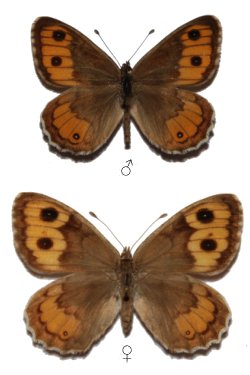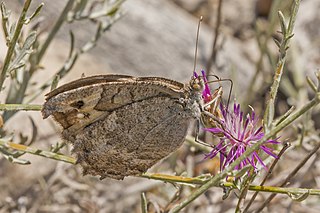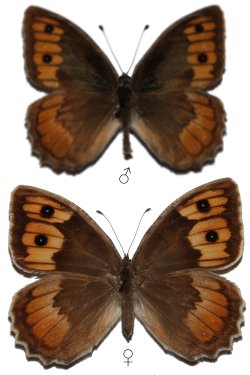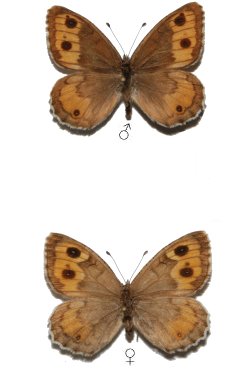
Anthocharis belia, the Moroccan orange tip, is a butterfly of the family Pieridae. It is found in northwestern Africa. The length of the forewings is 18–20 millimetres (0.7–0.8 in).

Agriades zullichi is a species of butterfly in the family Lycaenidae. It is endemic to Spain. It is a montane species confined to the Sierra Nevada. It is very similar to Agriades glandon and formerly was a subspecies of that taxon. The ground colour is more greyish. The larval foodplant is Androsace vitaliana.

Kretania hesperica, the Spanish zephyr blue, is a species of butterfly in the family Lycaenidae. It is endemic to Spain. Its natural habitats are temperate shrubland and temperate grassland. It is threatened by habitat loss. Seitz describes it thus - hesperica Rbr. is above sky-blue instead of violet-blue; from Spain.

Pseudochazara euxina is a species of butterfly in the family Nymphalidae. It is endemic to Crimea. Its natural habitats are temperate forests and temperate grassland. It is threatened by habitat loss.

Papilio hospiton, the Corsican swallowtail, is a species of butterfly in the family Papilionidae. It is found only in Corsica and Sardinia in the Mediterranean Sea.

Pseudochazara is a genus of butterflies within the family Nymphalidae.

Pseudochazara anthelea is a species of butterfly in the family Nymphalidae. It is found in Albania, the Republic of Macedonia, Bulgaria, Greece, Turkey and northern Iraq. The males can be easily distinguished from the females by the white base and they are found in dry, stony slopes and gullies, usually on limestone.

Maniola chia is a species of butterfly in the family Nymphalidae. It is endemic to Chios and Oinousses in the Aegean Islands. It is a very common butterfly found amongst grassy flowery places but it is almost impossible to distinguish the specimens from Maniola jurtina.
Hipparchia sbordonii, the Ponza grayling, is a butterfly of the family Nymphalidae. It is an endemic species found only on the Pontine Islands of Italy.

Pseudochazara cingovskii, the Macedonian grayling, is a species of butterfly in the family Nymphalidae. It is found only in the Macedonian village of Pletvar. The males are a little smaller than the females.

Pseudochazara mamurra, the buff Asian grayling, is a species of butterfly in the family Nymphalidae. It is confined to Albania, Greece, and Turkey. The habitat consists of slopes in steep river valleys.

Pseudochazara orestes, the Dils' grayling, is a species of butterfly in the family Nymphalidae. It is confined to Phalakron massif, Menikion mountains, Mount Orvilos – Greece; South Pirin mountains, precisely on the southern slopes of the Gradishte Hill in south-western Bulgaria.

Pseudochazara williamsi, the nevada grayling, is a species of butterfly in the family Nymphalidae. It is confined to the southern Spain (endemic).

Arethusana is a butterfly genus from the subfamily Satyrinae of the brush-footed butterfly family (Nymphalidae). It is composed of only one species, Arethusana arethusa, the false grayling.

Polyommatus atlantica, the Atlas blue, is a butterfly in the family Lycaenidae. It was described by Henry John Elwes in 1905. It is found in North Africa.

Polyommatus golgus, the Sierra Nevada blue, is a species of butterfly in the family Lycaenidae. It is endemic to Spain with habitat in the Sierra Nevada in Andalusia, and is an endangered species.
Pletvar is a village in Municipality of Prilep, North Macedonia. The critically endangered Macedonian grayling butterfly is only found in the Pletvar area. The father of Metodija Andonov-Čento an anti fascist fighter in World War II is from here.
Pyrgus aladaghensis, also known as the Aladagh skipper or Aladag skipper, is a butterfly of the family of Hesperiidae that was first described by Willy De Prins and Dirk van der Poorten in 1995. It is found on the Aladaglar massive of the Taurus Mountains near Niğde, in southern Turkey.

Ali Botush, also spelled Alibotoush, is a nature reserve in the small mountain range of Slavyanka, located on the border between Bulgaria and Greece. The reserve occupies the northern section of the mountain which lies within the territory of Bulgaria and takes its name from the old name of Slavyanka. It is situated in the municipalities of Sandanski and Hadzhidimovo, Blagoevgrad Province. It was declared in 1951 to protect the largest forests of the endemic Bosnian pine in the Balkan Peninsula. Its territory was further expanded several times and spans an area of 1638 ha or 16,38 km2. It was declared a UNESCO Biosphere Reserve in 1977.
















